On the 27 January 1916 the Military Service Act came into force in the United Kingdom (except Ireland), making every unmarried male aged between 18 and 41 (who was not in a reserved occupation) eligible for conscription into the armed forces.
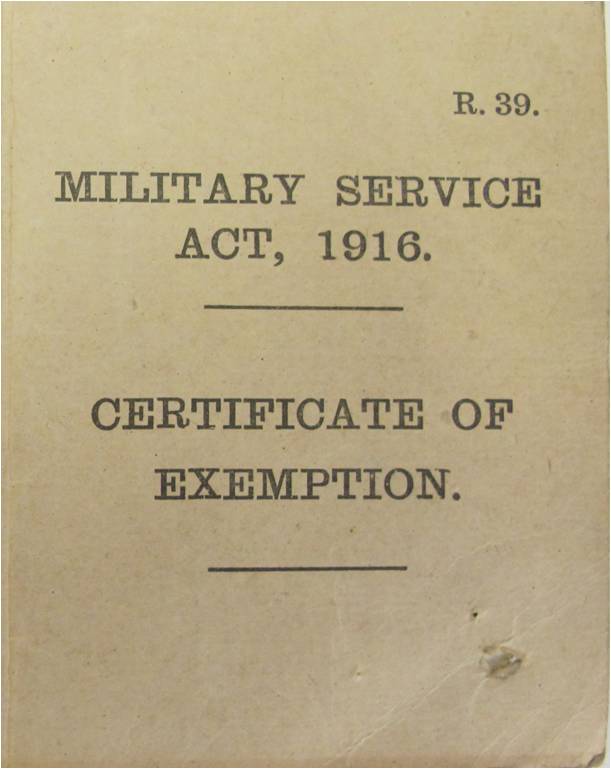
Example of a certificate
Men could apply to their local military tribunals for some manner of exemption based on a variety of grounds. Many men subsequently appealed this local tribunal decision, with appeal hearings held at County Appeal tribunals. After the war it was decided that only a sample of records from the Central Tribunal in London and the papers from the Middlesex County Appeal tribunal should be kept as a benchmark for England and Wales. It is these papers which make up record series MH 47 here at The National Archives.
These papers contain a wealth of personal information relating to the applicants, their jobs and their families. Currently the collection is underused due to its complex arrangement and convoluted indexing system. By making these papers name searchable and providing digital access we are hoping to open up these records to a much wider audience and open up another valuable First World War resource to those who have been frustrated in their search for a military service record.
In promoting this record series we hope to dispel some myths and stimulate some debate about just exactly who were the types of people who were seeking to gain exemption from military service and their reasons for doing so.
The first thing assumed, when thinking of people who were attempting to gain exemption from military service, is that the majority must be conscientious objectors. When we examined the records we found that of the 11,307 separate appeals heard between 1916 and 1918, only 577 were conscientious objection cases, just over 5%.

Harry Harris appealed his conscription on economic grounds so that he could look after his shop
There were, in fact, seven different ground on which you could appeal including economic grounds (preserving a business), hardship (having a family to look after) or on the grounds of ill health or infirmity.
It could also be assumed that because a man, conscientious objector or otherwise, appealed that he would be likely to get an exemption. In fact, the most likely outcome, the result of 45% of appeals, was that your appeal would be dismissed. The lack of success of appeals is surprising. What it meant was that most of the men who appealed did end up in the armed forces, in some capacity.
30% of appeals resulted in only a temporary exemption. When we look at these cases it becomes clear that the majority of the temporary exemptions ran for only a month or two, usually to ensure that the applicant could find somebody to take over their business interests.
Below we have included two examples which seek to highlight the type of records in MH 47, as well as their varied content. We also hope to show how these records will link into other records in our collection or available to view at The National Archives. We have chosen to contrast two men; one man had an appeal made on grounds of hardship, the other on grounds of conscientious objection.
The first man, Arthur Walling, was hoping for absolute exemption as his conscience would not allow him to be engaged in any work which supported the war.
In his supporting documentation (right) Mr Walling indicates he is “prepared to make any sacrifice” to safeguard his beliefs. Arthur was true to his word as he was one of 50 conscientious objectors to be sent to France to face a Field General Courts Martial.
The register of Courts Martial (in record WO 213/9) for 2 July 1916 shows 34 conscientious objectors were sentenced to death, having their sentence immediately commuted to ten years penal servitude.
We can contrast the fate of Arthur Walling to George Frederick James. An appeal was made (below) on his behalf by his father, Thomas, as two of his sons were already in the armed forces and another two children were still at school. This appeal was dismissed and George was called up to fight in March 1916.
Like so many servicemen, we are unable to find a service record in the burnt records. A search on the website of the Commonwealth War Graves Commission shows that George died on 5 April 1917. The unit war diary of the 6th Battalion, West Surrey Regiment for April 1917 (WO 95/1863/1) confirms on that date six other ranks were killed during front line hostilities.
We hope that these two cases highlight the varied nature of the appeals that were heard by the tribunals between 1916 and 1918. Likewise, they give an indication into the tensions that the demands of warfare can create between a government and its people, as the need to balance industrial and military manpower requirements clash with individual personal circumstances, responsibilities and beliefs.
Over the coming months we will be blogging further updates from the project as well as interesting cases we have uncovered. To learn more about the project to digitise these records please see our project web page: nationalarchives.gov.uk/conscription-appeals
This project has been jointly funded by the Friends of The National Archives and Federation of Family History Societies (FFHS).
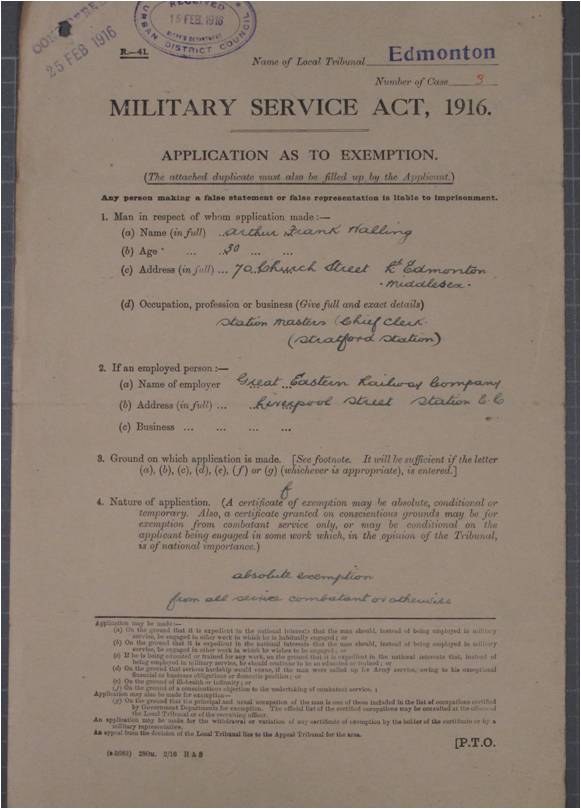
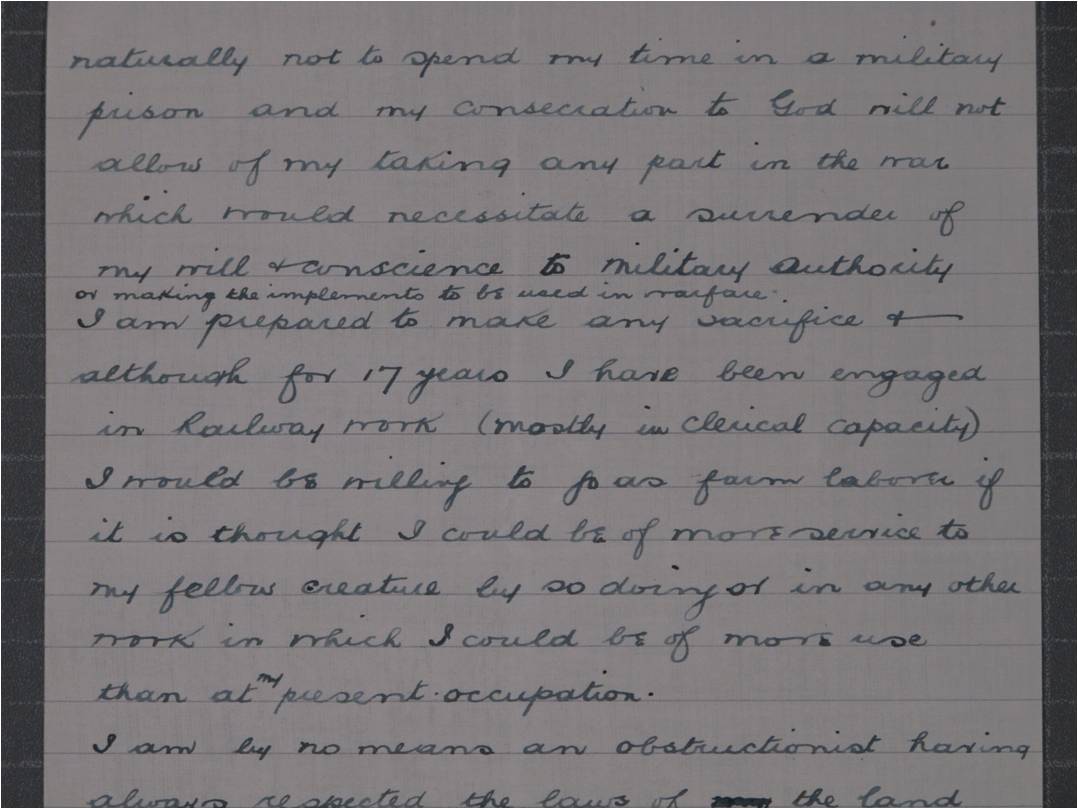
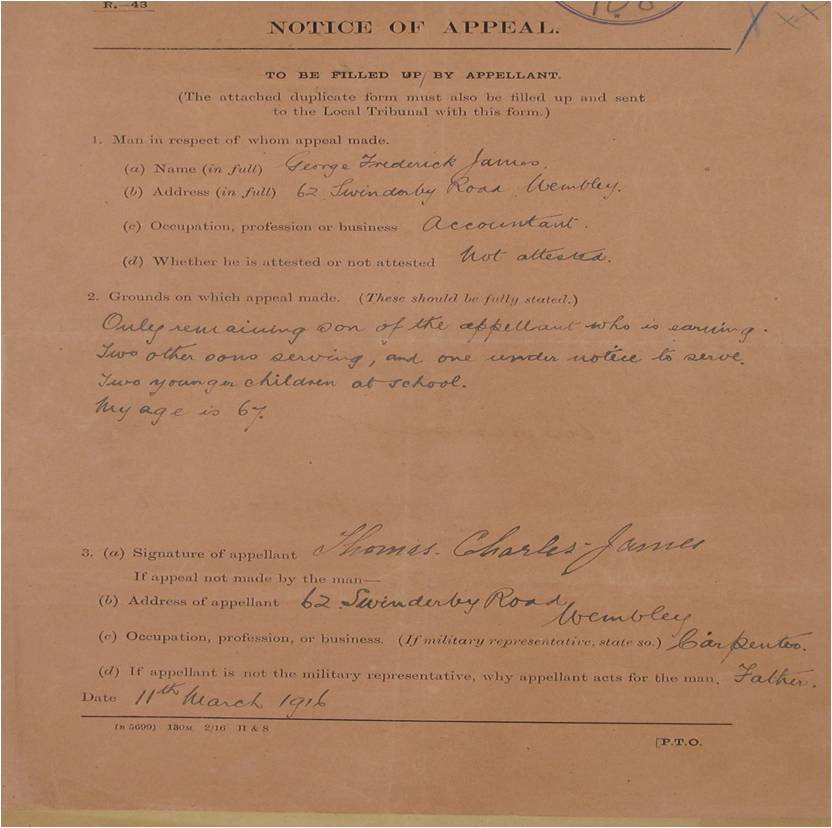
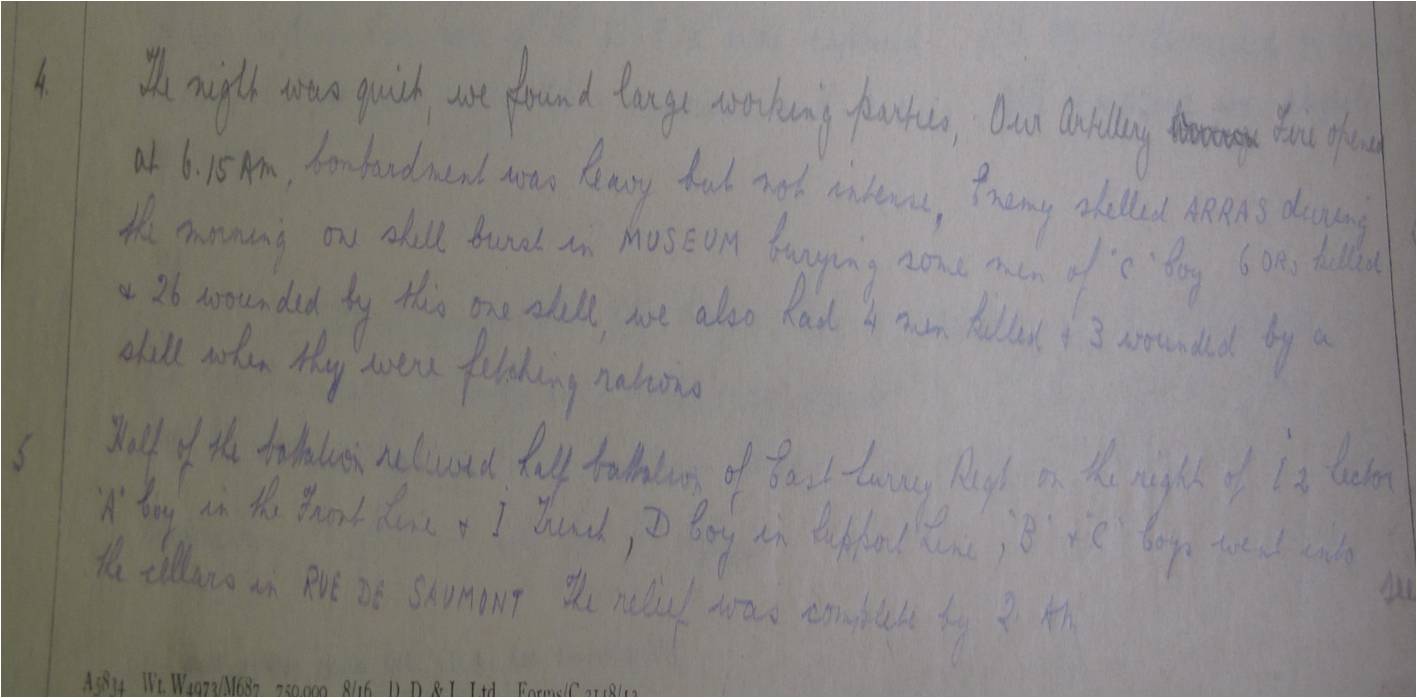
Could you explaain the statement that these are the only records for England and Wales that survive as there are according to the National Records of Scotland, who released their records (including Ross, Cromarty and Sutherland), and they talk about the records in local archives with Northamptonshire and Staffordshire along with the National Library of Wales having some.
Only the records for England and Wales survive within record series MH 47 here at The National Archives.
You are correct in saying that the tribunal records for Peebles and Lothian survive in Scotland.
Our project website (www.nationalarchives.gov.uk/conscription-appeals) explains that fragments of other county records and records of local tribunals do exist in other county records offices. Try searching Access to Archives (www.nationalarchives.gov.uk/a2a/) to see what records survive for other counties.
As Chris mentions, you can search Access to Archives for details of tribunal records which have survived in other counties, in addition to ‘officially’ retained records of the Middlesex and Peebles and Lothian tribunals.
However, there is currently no comprehensive list of the fragmentary collections that consist elsewhere, and their extent, so we’re looking into how we can work with the Federation of Family History Societies, one of our project partners, to undertake a survey.
The FFHS are going to survey what other ercords exist at local level. Already within the blog there has been reference to some Scottish records that have survived.
We will be contacting our member socities and local repositories to see what records still survive.
If anyone knows of records in public or perhaps private hands could they let me know on Chairman@FFHS.org.uk we will then try to extend the list of records and perhaps see if there is a way that indexing of local records could be encouraged..
Further to the info from Chris, government instructions following the end of the war were for the Local Government Boards, which oversaw the military service tribunal system, to destroy all tribunal papers. Only two sets were retained by the Government to act as a benchmark for potential future use.
Some local authorities did not fully comply with the Government order and that is why we can find fragments of material at local archives or county record offices. By and large these will be restricted to minute books but Northamptonshire, as mentioned by David above, have case papers from the Northamptonshire appeal tribunal. It is these case papers which can provide a more direct insight into the very personal, individual nature of these records.
A great initiative. These records were almost impossible to use. I am sure they will offer a unique insight into the Great War and its impact on ordinary people.
The Library of the Society of Friends (Friends House, London NW1 2BJ: http://www.quaker.org.uk/library ) holds a number of printed and unpublished collections on conscientious objection, including for the period 1916-1919. Some are described in a subject guide (see http://www.quaker.org.uk/subject-guides ); this guide was written in the early 1990s and is due for revision and addition. Although the main work of Quaker organizations such as Friends Service Committee (supporting applicants and appellants) concentrated on Quakers, a number of other individuals are recorded as COs. There is research ongoing to compile a world war 1 COs database for uploading. From TNA information and other sources, including information kindly provided by James McDermott for Northamptonshire, the Library has been making the beginnings of a draft location list of Tribunal records.
I am looking for clarification about the Central Tribunal (CT) records you refer to. The Record Summary for MH47 suggests that the minute books and selected papers are extant whereas your blog suggests that “only a sample of records” for the CT have survived. Although these two statements are not mutually exclusive, can you confirm that the minute books will be included in this project.
The reason for my question is that six St Albans men were given leave to appeal to the CT from the Herts County Appeal Tribunal and I want to confirm the outcomes of their hearings.
Jon – thank you for your message. Yes, the Central Tribunal minute books will be included in the project.
The Central Tribunal minute books from July 1916 onwards do appear to list each case heard by the Tribunal and the final decision is recorded.
Before July 1916, it is not quite as thorough, being more statistical based – listing the number of cases heard and the number of decisions made. A handful of cases are detailed but not all from this early period of the tribunal systems.
There does not appear to be an index to the Central Tribunal minute books, so you will need to know an approximate date that the cases were heard and trail through.
I can confirm that the case papers we have from the Central Tribunal are only a very small sample.
The problem that you have identified with the catalogue descriptions underlines the difficult nature of searching these records at present. We hope that when the project is finished, we will be able to give a much more detailed description of what these records do contain.
David – are the Middlesex Appeals Tribunal’s letter- and minute-books also to be digitised, in addition to the individual case forms?
Hello James – Thank you for your message.
Yes, the plan is to digitise all the surviving papers that we have in MH 47 for the Central and Middlesex tribunals. The only exceptions to this will be the card index (which will be redundant when the case papers are name searchable) and the Middlesex Appeal tribunal registers (also redundant).
As you have probably experienced with your own extensive tribunal research, some of the letter books can be quite difficult to read given the carbonated form that they come in. The minute books are in much better condition however, although the Middlesex minute books do not appear to detail every case heard.
I hope this helps – we’d be delighted to hear any suggestions or feedback you may have about the project as we progress, given your work on the Northamptonshire appeal tribunal.
Regards
David Langrish
David,
I’d be happy to oblige. Hopefully someone’s eventually going to be carrying out a similar exercise with the Middlesex records as mine with Northamptonshire’s, in which case this project will be a huge help.
Question on exemptions and Ireland and Scotland… I’m researching WWI and my g-grandfather’s travels. He was born in Co. Monaghan in 1878, relocated to Glasgow in 1901, married in 1902 & had 6 kids, and left Glasgow for Ireland with the remaining family (3 kids died in Glasgow), wound up in Dublin days before the Rising, and settled back in Monaghan in 1917 until his death in 1946. Would he have required some sort of paperwork to avoid conscription, or did mere residence in Ireland exempt a married man? If residence was all it took, did anyone relocate to Ireland to avoid conscription? (and I realize that may be a silly question…)
I’m trying to figure out what caused the relocation back to Ireland — I think his appearance in Dublin at the time of the Rising was a coincidence. I wasn’t sure if he had to “register” as an Irish resident after years of living in Scotland. (I do realize that at the time Ireland, Scotland and England were all part of the UK, and were governed by the Military Services Act.)
I’m not looking for detailed genealogy information on my g-grandfather — just how Ireland was dealt with (e.g., was there a need for Exemption Certificates?). Any direction is much appreciated! Many thanks!
– Roxe Murray
Ottawa, Ontario, Canada